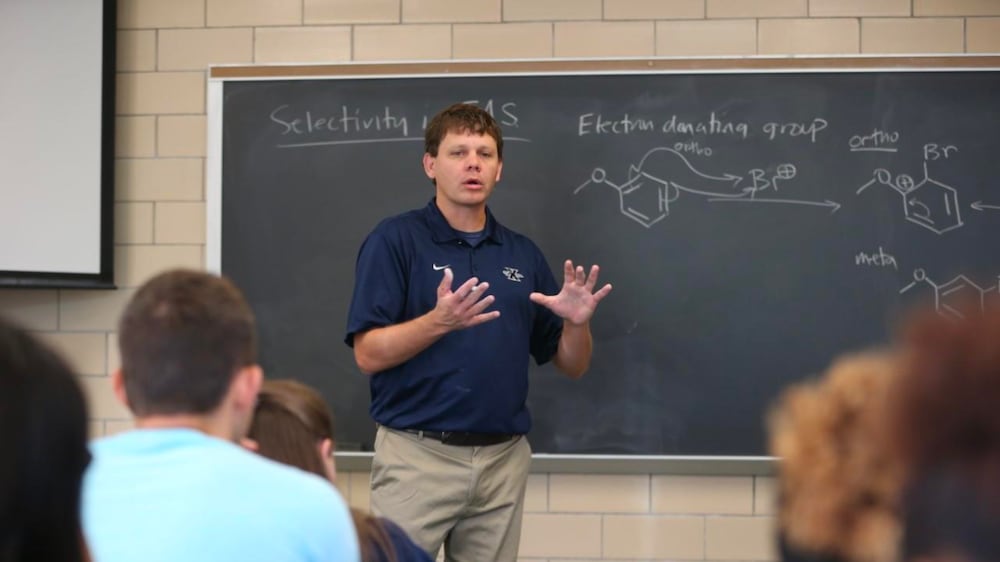
Teaching Organic Chemistry: Q&A with award-winning professor Richard Mullins
Organic chemistry is considered one of the more difficult subjects to teach and learn. Even award-winning professor and author, Richard Mullins struggled with the course during his undergraduate.
We caught up with Rick to learn about his experience with organic chemistry as a student, why he chose to author a textbook, and his approach to help students tackle one of the toughest science courses.
Organic chemistry is notoriously one of the toughest courses for students. Tell me a little bit about your organic chemistry experience as an undergraduate.
Yes, organic chemistry is known for being a “weed out” course. Students have to take it if they want to go to medical school. When was in college, that was my plan: I was going to be doctor; nothing could change my mind.
As a student, I had felt really good about my ability to study and learn. But when I took my first exam, I got a C. I was devastated.
But being a hard worker, I thought: “It's OK. I'm going to double down. I'll do what I always do for biology, for high school, for general chemistry.” I studied the same way, even harder. My reward was a D. I went from a C to a D from exam one to exam two.
Oh wow. How did you go from a struggling organic chemistry student to an award-winning organic chemistry professor?
After getting my grade back from that exam, I went to the professor and asked for help. Through that conversation and the hundreds afterwards, he helped me to learn organic chemistry.
Since I was never great at memorizing, he taught me to understand the logic, to connect concepts, and to look for trends. In some ways, I was weeded into organic chemistry because, at that point, I fell in love with the subject.
If I look back on my life, my organic chemistry professor changed my direction. I really idolized him and wanted to have the effect he had on me with students in my own class. Eventually, I decided to go to graduate school. Fast forward and here I am as an organic chemistry professor.
"I really idolized my organic chemistry professor and wanted to have the effect he had on me with students in my own class."
What eventually prompted you to write an organic chemistry textbook?
Over the course of my time as a professor at Xavier University, I pledged to see organic chemistry through the eyes of the students. I wanted to try and encounter organic chemistry as they would, as I did as a pre-med, biology major.
However, I still encountered some challenges teaching organic chemistry.
When I started teaching, one thing students often said on Rate My Professor and teaching evaluations was to not read the book and just go to lecture. The question came to mind: why is the lecture so much better for the students than the book?
"I pledged to see organic chemistry through the eyes of the students."
This made me think that maybe there’s a need for a better book—one that is more like lecture. In lectures, I can form relationships with students. I can get to know them. They can ask me questions. We can work on problems together.
Think about when you last studied a book that can do those things too. So I began thinking:Can we write a book that takes the best of lecture and puts it into a textbook?
Can we establish a relationship with students through an organic chemistry book? We all read novels and develop relationships with the story or characters. But can an organic chemistry book establish a rapport with the students?
Can it meet them where they are? Can it anticipate questions? Can it ask questions for them? Can the book have a personality?
That was kind of the beginning of the idea for this project. Personality can engage students—that’s what we do in the classroom. If we can do that in a textbook, we can engage them in the same way.
"Can we write an organic chemistry book that takes the best of lecture and puts it into a textbook?"
We’ve heard students say that reading your textbook felt like having a friend in the course. How did you manage to build this rapport with students through a textbook?
That’s lovely to hear. The book’s introduction starts with me telling my personal story and sharing advice on how to best succeed in organic chemistry with tips like having a growth mindset, grit, and study strategies.
I think this does two things:
- It shows students that learning and being successful in organic chemistry has value beyond passing this course when they head into medical and graduate school.
- It acknowledges that students are fully capable and competent to learn even the most difficult material with the right toolkit.
Throughout the textbook, there is a cartoon called Rick. That’s another thing the book does to lighten the mood.